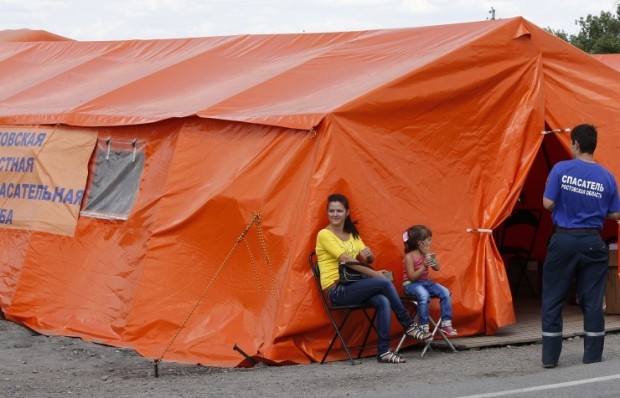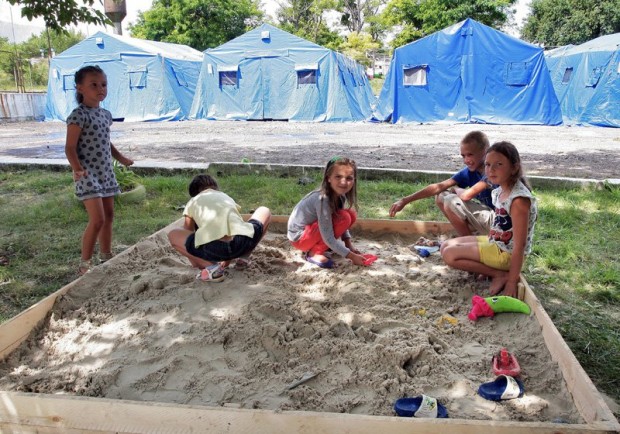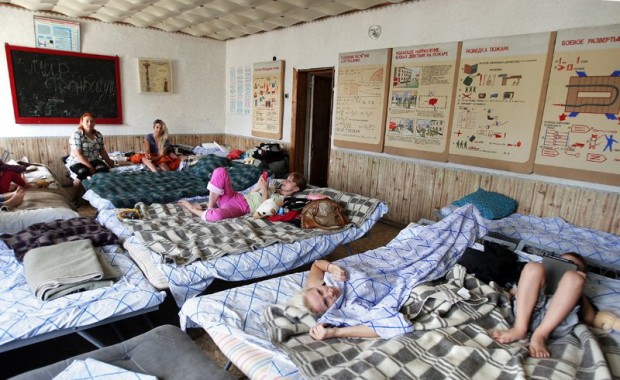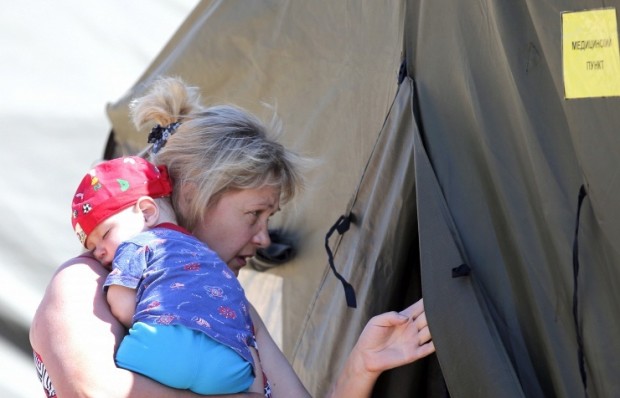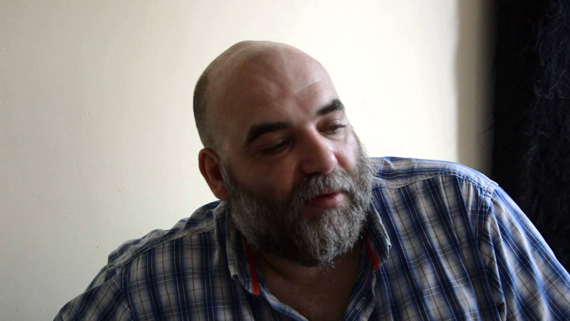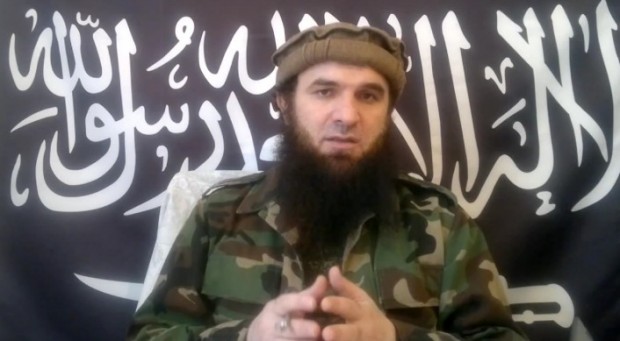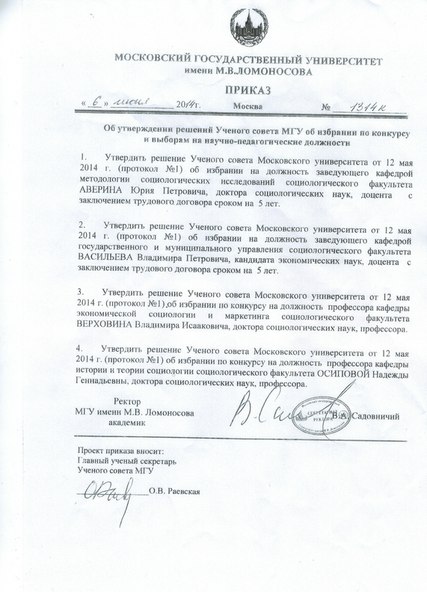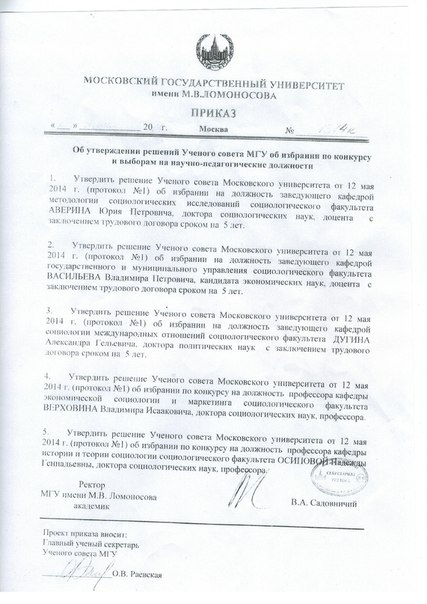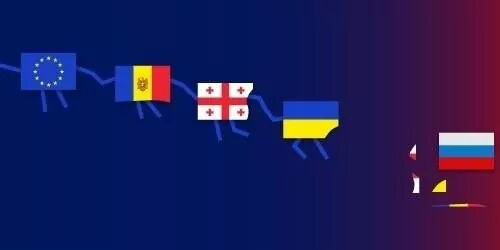Updated Daily. The Russian government’s numbers of “110,000” refugees from the armed conflict in Ukraine are clearly exaggerated, even if there are likely at least tens of thousands, but with reporters barred from the area and towns under declared states of emergency, it’s difficult to get the real story. The US government has added Chechen strongman Adam Delimkhanov, a close associate of President Ramzan Kadyrov, to its sanctions list. A member of the Presidential Human Rights Council tasked with monitoring human rights in Ukraine has been beaten in Voronezh. Separatists from the “Donetsk People’s Republic” staged a propaganda bus tour to a Ukrainian army base they claimed was surrendering, but the trip ended in the death of a journalist from shell fire. Last week, ultranationalist and Eurasianist ideologue Alexander Dugin announced that he had been fired from Moscow State University.
For last week’s issue on the Russian finance minister’s admission that the government has raided the pension savings of ordinary Russians to pay for the forcible annexation of the Crimea — and will not be returning the funds; on continued harassment of opposition blogger Alexey Navalny with libel suits and fabricated criminal cases — as well as a public witch-hunt; on a new government program to aggressively combat ill-defined ‘extremism’ under the new anti-terror laws will target civil society — and also enlist citizens’ groups and ethnic associations to educate and displace dissenters, as in the Soviet era, go here.
For the previous week’s issue on yet another provocation against State Department spokesperson Jen Psaki, this one involving an outright fabrication of quotes; prospects for the government’s blocking of Twitter; the killing of two Russian state TV journalists and a debate about reporters’ safety and war propaganda by correspondents embedded with pro-Russian separatists; nationalist and socialist party activists demonstrating on behalf of the Donbass Russian-backed separatists in Moscow, and some protesters responding to vandalism of the Russian Embassy in Kiev with attempts to attack the Ukrainian Embassy in Moscow, go here.
Please help The Interpreter to continue providing this valuable information service by making a donation towards our costs.
July 4, 2014
2317GMT: The US State Department has questioned the figure of “110,000” refugees coming from Russian officials in recent weeks, clarifying that the UNHCR had actually stated that there is a lot of movement back and forth across borders, and it was difficult to make definitive claims about those who have fled fighting in southeastern Ukraine.
The following is an excerpt from the press briefing at the State Department on 1 July:
“QUESTION: Was there any discussion there about the humanitarian situation in the east? I know President Putin had talked to President Poroshenko about this. They’re trying to open up a corridor for some kind of humanitarian relief. You have people who are trying to leave the country, there are a lot of refugees there. It’s kind of an awful situation and it’s also something that the President of Ukraine should also be concerned about. Has anything been done with regard to that?
MS. HARF: Well, certainly the President of Ukraine is concerned about it, but this humanitarian situation there is a direct result of Russian-backed incursions there. There was not a humanitarian situation there before the separatists started killing people. So let’s be clear about the cause of this.
In terms of the numbers, I don’t know if Jen got this yesterday in detail, but we talked a little bit about the UNHCR’s numbers. In many – we don’t question the UNHCR’s credibility. We obviously think they’re an important organization. In many cases such as in Syria, data comes from multiple independent sources. We think that’s important to back up the data. In this situation, UNHCR’s estimate of the number of people moving across the Ukrainian border comes directly from Russian Government sources who, suffice to say, have not always been entirely accurate here. And – just a couple more points on this because I know there have been some questions – UNHCR’s statement did not say that 110,000 refugees fled Ukraine into Russia. What it said is that number of people had crossed the border at some point. That could be to go visit their grandmother and come back. The – only 9,600 people have actually applied for asylum in Russia. And I just want to be very clear when we talk about numbers because there have been some confusion here. And we continue to support the work of UNHCR and attempt to get alternative sources of information for them.”
The invocation of the “stay at grandma’s” has angered Russians and the Russian propaganda mill has had a field day with quoting it out of context, just as it does all State Department comments; in recent weeks, Russian state media had utterly fabricated a purported quote from State Department spokesperson Jen Psaki, claiming that she said people were in “the mountains of Rostov for its curative air,” not as refugees from Ukraine.
@statedeptspox hi, Jen. Have you got a grandmother in Russia? Why don't you come and visit her?
— Алексей Матвеев (@alexvmatveev) July 2, 2014
But it’s important to know that three weeks ago, Russian officials themselves said exactly the same thing, RFE/RL reports:
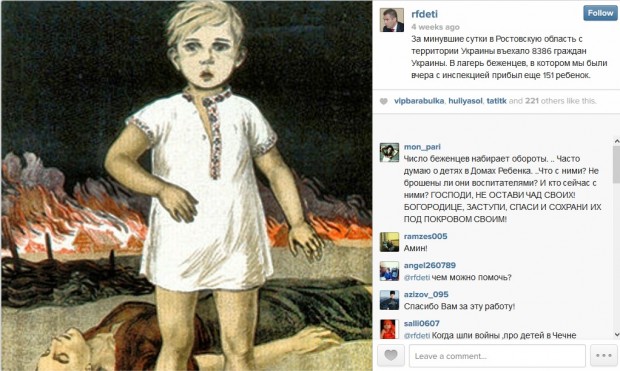
Screen grab from Instagram account of Russian Children’s Ombudsman Pavel Astakhov, with sketch of refugee child.
“Russian children’s ombudsman, Pavel Astakhov, said earlier this month that more than 8,300 Ukrainians had fled to Russia’s southern Rostov region in just one day.
‘An additional 151 children arrived at the refugee camp that we inspected yesterday,” he wrote on his Instagram account, illustrating his statement with a drawing showing a haggard-looking child standing next to the body of her mother on the backdrop of a burning village.
Rostov authorities were quick to reject this figure.
‘Eight thousand three hundred Ukrainians crossed the border over the past 24 hours, but this doesn’t mean that all of them are refugees,’ said Aleksandr Titov, a spokesman for Rostov regional governor Vadim Artyomov. “These people could be visiting their relatives; they could have come for a vacation or for other purposes in other regions of Russia.”
Russian deputy Prime Minister Olga Golodets has since put the number of refugees at just over 2,500, saying the country stood ready to take in another 10,000.”
One wonders why Astakhov couldn’t have illustrated his claim with a photo of a real child, and it’s interesting to see a local Rostov official correct Astakhov,a leading Kremlin propagandist, known for justifying the ban on foreign adoptions.
Most reports in both state and independent media describe refugees or IDPs who are sympathetic to the pro-separatist cause, but Ukrainian media is also reporting some cases where people blame separatists for disrupting their lives or shelling their homes.
2307GMT: According to Novaya Gazeta and Western wire services, OSCE general secretary Lamberto Zannier and Rasa Ostrauskaite, Deputy Director of the OSCE Centre for Conflict Prevention visited the Dmitriadovsky resort home in Rostov region, where there are refugees from Ukraine, and also the Pioneer camp. Caucasian Knot had a more detailed report on his visit 12 June.
This article said there were 16 municipalities of Rostov Region that had accommodated 3,070 citizens of Ukraine, including 1,263, citing the Rostov Region government’s press service. Those figures seemed more realistic at the time than “35,000”, and were supplied by officials who didn’t account for where “the 35,000” were. Rupaper.com reported that the refugees were unhappy with Lannier’s invocation of “President Poroshenko” as they said they hadn’t voted for him.
RFE/RL also had a video report from the scene:
To add to the confusion, this story cited at the time the self-proclaimed “Donetsk People’s Republic” leader Denis Pushilin as claiming there were “already about 15,000 refugees” (unconfirmed) who had crossed the border from Ukraine into Russia, but also cited Russian Human Rights Commissioner Ella Pamfilova on 11 June who said “the last 2-3 days, a big flow of refugees from Ukraine, from Slavyansk and Kramatorsk, went to the Crimea.”
The OSCE Special Monitoring Mission in Ukraine occasionally reports the movement of displaced people, such as this report 6 June on 6 busloads of IDPs of 328 people hosted locally or this report 20 June about 514 registered IDPs, 80 percent of whom were women, children and elderly, and an estimated 200 unregistered IDPs, and complaints about the difficulty of funding their needs.
But it does not appear as if OSCE as a body has made a definitive statement about the total cumulative number of IDPs and refugees in the Russian and Ukrainian regions now, although unlike the UN, they have regular observers on the ground in the regions of reported refugee camps.
According to this monitoring report, the UNHCR was brought in to train OSCE monitors “to strengthen the capacity of the SMM to monitor and report on the situation regarding IDPs.” But the OSCE’s own civilian military monitors were kidnapped in Donetsk and Lugansk, and held for nearly a month before finally being released. That tends to put a chill on monitoring — and finding people willing to serve as monitors.
2257GMT: A key reason why it is difficult to assess the refugee situation in Russia is that except for a few trusted state outlets, journalists are not allowed to see the camps or interview people in them.
In a story dated 12 June, the independent online news site Novaya Gazeta reported that journalists were not allowed to see refugees coming from Ukraine.
As of that date — nearly 3 weeks ago — 35,000 persons were said to have fled — numbers which simply couldn’t be verified. They were said to be held in resorts, summer camps, and home-stays in towns in Rostov Region. As far as is known, the ban on reporters remains within the south of Russia; some reporters have been allowed to see camps in Crimea.
In the town of Gukovo, says Novaya Gazeta near the Ukrainian border, there were said at that time to be 2,000 refugees who were held in temporary housing there, and then moved to summer camps. But journalists were not allowed near them.
At this location, reporters learned why (translation by The Intepreter)
“These are families of the [separatist] militia, and for the purposes of security, we cannot give their names or let journalists in to see them,’ one of the volunteers of the people’s militia who was accompanying the refugees said. ‘They themselves do not know what will happen to them next.'”
Another reason cited for why reporters can’t be allowed to see the camps is that the areas are put under states of emergency, and to work in such zones, journalists need special accreditation. When Novaya Gazeta tried to find out how to get such permission, they were sent to the local Emergencies Ministry office, which said that they couldn’t supply accreditation and advised them to go to the regional government.
Novaya Gazeta managed to find one refugee woman who agreed to give them an interview, but she gave only her first name and patronymic. She said she had been brought into Russia by circuitous routes out of Nikolayevsk in Ukraine, and since she had a nephew in Russia, she decided to stay. While at first she feared retaliation, she then decided to talk because “they will go on bombing Slavyansk anyway.”
Novaya Gazeta was also able to learn the names of the towns where “states of emergency” have been declared, which means there are likely refugees there — or maybe fighters moving in and out of the area: Azov, Gukovo, Donetsk, Zverevo, Novoshakhtinsk, Taranrog, and also Neklinovsky, Matveyevo-Kurgansk, Kuybyshevsky, Rodionovo-Nesvetaysky, Krasnosulinsky, Kamensk, Tarasov, Millerovsk, and Chertkovsk districts. Yet no bloggers or citizens’ reporters have been known to report from these towns.
2226GMT: As attacks by both sides in the conflict instigated by Russia in Ukraine increase since the end of the ceasefire (and with uncertainty about the beginning of a new one), claims of huge refugee flows reaching even 110,000 have continued to emanate from the Russian government and state-controlled media.
The figure of “110,000” with “16,000 just in the last week” has been picked up by the Wall Street Journal because it appears to have come from a reliable source — the UN High Commissioner for Refugees (UNHCR) — which had also begun to cite the number “110,000”.
Is this number credible? There’s no question that there are likely tens of thousands of refugees leaving Ukraine as well as many thousands more of internally-displaced persons (IDPs) on the move, but the figure definitely appears inflated. It’s important to note that the UNHCR has not independently confirmed this figure; they are not running camps nor do they appear to have a presence in the region, outside of offices in Moscow and Kiev. As is usual in such “complex emergencies” (as man-made disasters of war are known), the UN takes the figures provided to it by the member state, in this case the Russian Federation, which has a seat on the UN Security Council.
It’s also important to note, as we have reported in the past, that the Russian media can post wildly different numbers within days or even within the same article, and they don’t appear to be based on actual journalistic investigation but are repeated from officials. And people stopped believing the Russian state media when earlier in the war, they made wild claims of “625,000 refugees” queuing up at the Russian border, and showed pictures from other countries.
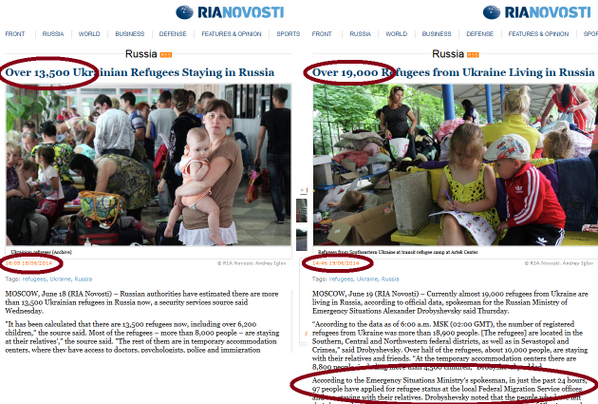
In the past, when as many as 100,000 people were forced to flee suddenly within days or week, there was no mistaking their presence. Even in the era before ubiquitous cell phones and Internet in the second Chechen War, when that many people fled within days from Chechnya to Ingushetia, non-governmental groups and Ingushetia’s government faxed out emergency requests and detailed information about people and conditions that were then authenticated.
In more recent times, in June 2010, when that many people fled Kyrgyzstan for Uzbekistan during ethnic pogroms in Osh, the refugees themselves already had cell phones in hand which they could use to show pictures to waiting CNN camera crews and online social media, and Tashkent allowed UNHCR to operate temporarily in the region. There were numerous eye-witnesses from ordinary people, journalists, human rights groups and relief organizations on the ground, so numbers were easily proven.
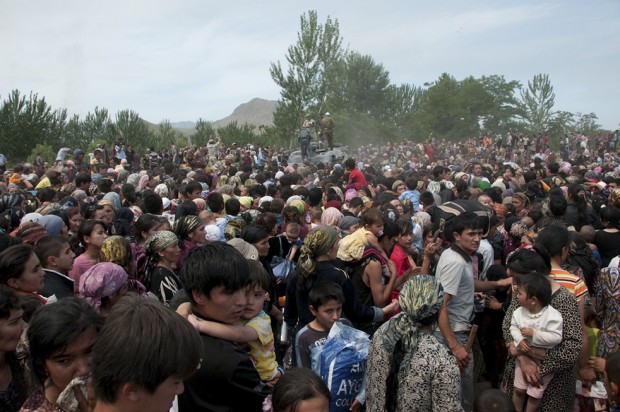
Ethnic Uzbek refugees flee from Kyrgyzstan into Uzbekistan in June 2010. AP Photo/D. Dalton Bennett)
None of that is happening in the south of Russia now. If the Russian government, and specifically the Emergencies Ministry (known as EMERCOM) wants the world to believe their claims, they will have to start allowing in both international relief workers and journalists on a regular basis.
But what’s not realized by most of the Western press repeating these numbers is that for the most part, the Russian media — both independent and state — are not allowed to see these camps purportedly holding so many refugees.
In the latest report today from ITAR-TASS, the “110,000” figure appears to be dropped, and now the claim is 268 temporary accommodation centers in Russia now house more than 18,200 people.
Of course, it’s possible that by “110,000,” the Russian government means a combination of all refugees and IDPs throughout the region — that is, all those who have fled southeastern Ukraine into Rostov Region in Russia; all those who left Ukraine for Russian-occupied Crimea; and all those who remain internally-displaced on the Ukrainian mainland.
But only two weeks ago, UNHCR estimated 17,500 IDPs in Ukraine, did not cite a figure for refugees now in Russia — and the number still don’t add up.
ITAR-TASS reported that “1,000 refugees” were moved out of Rostov Region into other areas of Russia, including Dagestan — but what about the rest of them?
Voice of Russia reports that “about 500 refugees from the south-eastern regions of Ukraine arrive every day”. Apparently at least this Kremlin-run outlet was able to come in and take pictures of refugees in Russian-occupied Crimea, but they don’t show how they got such large numbers or where all these people are.
Whether 18,200 — which seems realistic for Rostov Region although we cannot verify it independently — or more if combined with other areas, one thing is certain: more are coming, and fewer are likely to return in the near future. Indeed, what does make it difficult to count people is that there is already a lot of cross-border traffic in this region and lots of relatives on both sides. As Russian media has noted, people don’t want to get the label “refugee” and possibly lose their right to work or travel so they may avoid registration and try to arrange home-stays.
Russian Health Minister Veronika Skvortsova appealed to her counterpart in Ukraine, Oleg Musy, with a request to allow all those seeking medical treatment in Donetsk and Slavyansk, where battles continue, to be treated within Russia. The hospitals lack electricity, water and medications, and are unsafe.
July 2, 2014
1917GMT: The US government has added Chechen Adam Delimkhanov, a close associate of Chechen President Ramzan Kadyrov on the US Treasury Department’s list of “specially designated nationals” in transnational criminal organizations.
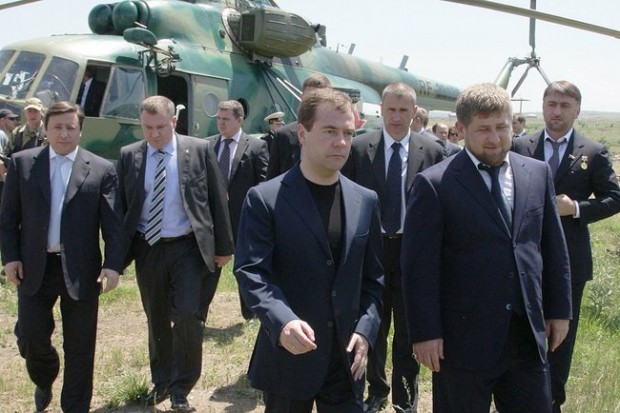
Adam Delimkhanov (on the extreme right) with Dmitry Medvedev (front left) and Ramzan Kadyrov (front right)
Delimkhanov is suspected of masterminding the 2009 murder of former Chechen warlord and Russian military commander Sulim Yamadayev in Dubai, where the attackers first put three bullets into his heart as he stepped out of his car, then discarded a gold-plated handgun, Moscow Times reported. He was put on the Interpol wanted list at that time, but later came off.
A Chechen exile, Umar Israilov, later murdered in Vienna in January 2009, had once accused Delimkhanov of beating him in Kadyrov’s presence but he denied the charges.
Delimkhanov, known as “Kadyrov’s personal executioner,” has been a member of the Russian State Duma since 2007. He is particularly famous in Russia for getting into a brawl in parliament, during which a golden gun fell out of his pocket.
Delimkhanov objected to claims his fellow Chechen deputy Alexey Zhuravlyov said about the opening of a monument to Chechen women who resisted Russian troops in the region’s conquest in the 19th century. Interfax reported that the two deputies were ultimately reconciled and that their disagreement was “normal” and “part of democracy.”
Supposedly by law, deputies are barred from carrying firearms into the Duma building, but because they have immunity, guards are forbidden from searching them.
He was also notorious for threatening human rights activists.
An outdated but useful background on Delimkhanov can be found here.
0739GMT: A Moscow court extended opposition leader Alexey Navalny’s house arrest for a further three months. A legal correspondent for Ekho Moskvy and RAPSI, the legal news service, reports:
Суд продлил на 3 месяца (+ к 5 годам) испытательный срок Алексею Навальному по приговору по делу "Кировлеса".
— Mari Gusarova (@MPGusarova) July 2, 2014
Translation: The court extended the probation of Alexey Navalny by 3 months (+ to 5 years) in the sentence in the Kirovoles case.
0707GMT: A candidate in the troubled elections for the Moscow municipal legislature has been directly threatened with reprisals on pro-government NTV, snob.ru reported.
Journalist Olga Romanova, who is head of a civil rights group called Jailed Russia, was targeted in a special feature by NTV called “Emergency: Wrong Defenders” aired last Sunday, which purported to show that human rights activists were corrupt extortionists with ties to the ultranationalist Right Sector in Ukraine. Romanova’s husband is Aleksey Kozlov, a businessman believed to be wrongfully imprisoned in 2008. Romanova published his jail diary on a blog and later turned it into a book. She was for a time chief editor of the Russian edition of Business Week and chief editor of slon.ru.
Slon.ru blogger Stanislav Kucher wrote (translation by The Interpreter):
“You can have different views on the work and human rights activity of Olga Romanova. You can speak in various ways about her on TV. But to my recollection, for the first time, a national television channel has placed on the air a cold-blooded promise to target a citizen of the RF with reprisals.”
Evgeny Levkovich wrote on his blog:
“‘Olga Romanova is sponsored by Right Sector and the fighters battling against the militia in the south east.’ This is what NTV says. In prime-time. On Sunday. If it weren’t for the height of the election campaign, and the telephone ringing off the hook from pensioners since morning, I would say that this was a win.
But seriously, we don’t have money even to print enough booklets with our election program. Not to mention all the rest. We need your help as before. Sorry, Right Sector and the National Guard. We have nothing to justify trust in us. Perhaps in another life.”
Yevgeniya Albats, editor of New Times wrote on her Facebook:
“We are simply obliged to help Olga Romanova get elected to the Moscow City Duma. She is threatened — by a former prisoner, the chief hero of the serial Zone on NTV. We don’t have any any other form of defense for her. Therefore, if you live in the TsAO, give her your signature. Before 10 July, she needs to gather 5,000 signatures.”
The video has now been removed from the news sites and some YouTube accounts. But it can still be found on other YouTube accounts. In lurid tabloid TV fashion, NTV claims that a number of people calling themselves “human rights advocates” have extorted money from persons arrested or convicted of crimes, promising to get them out of jail, and then running off with their money. Romanova is accused of getting support from Right Sector in Ukraine.
At about 8:00 minutes, a former prisoner can be seen making a direct threat against Olga Romanova, saying “No matter where you, no matter who you are with, no matter what [expletive] is protecting you, no matter where you are, you will be found and torn apart.”
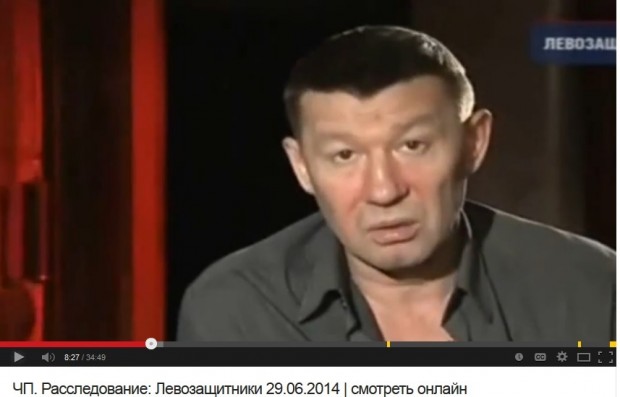
Screen grab of ex-con making a threat to Olga Romanova from NTV feature “Wrong Defenders” aired 30 June 2014.
Romanova herself has taken the threat in stride and has written a telegram to Vladimir Kulistikov, general director of NTV:
“Dear Vladimir Mikhailovich:
Thanks to television channel NTV and you personally for your tireless work in raising my rating for the flattering evaluation of my activity and its scale and my personal power as a winning independent candidate for deputy of the Moscow City Duma.”
0554GMT: A Russian human rights leader known for his work at home and abroad and recently active on the situation in Ukraine has been beaten in the provincial town of Voronezh, colleagues and RIA Novosti reported.
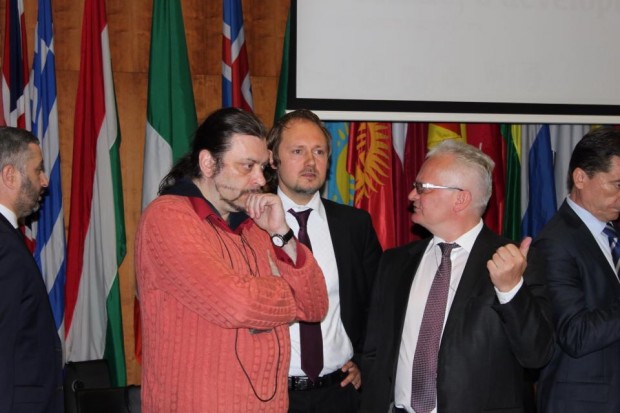
Andrei Yurov, member of the Russian Presidential Council for Human Rights with Ambassador Cekuolis, Lithuania’s permanent representative to the OSCE in May 2014
Andrei Yurov, founder of the Moscow-based Youth Human Rights Movement and a member of the Russian Presidential Council on Human Rights (CHR), was attacked by two masked, unidentified persons yesterday near the office of Human Rights House in Voronezh. At about 7:00 pm local time, the assailants beat him over the head several times and sprayed zelyonka on him, a type of indelible green disinfectant often used to humiliate activists and politicians in both Russia and Ukraine.
Yurov was treated in a local hospital for his injuries and is being examined for possible chemical burn of his eye.
Yurov is also active in the Civic Solidarity Platform, a network of NGOs promoting human rights through the Organization of Security and Cooperation in Europe (OSCE). He is also an expert of the Moscow Helsinki Group.
On 25 June, Yurov was made co-chairman of the Presidential Council’s temporary working group to monitor human rights in Ukraine and promote civic society in the Republic of Crimea.
Reached by the Russian news service lenta.ru, Yurov described the attack. The Interpreter has provided a translation:
“I was attacked today in Voronezh by two people in black masks, they dealt several blows and sprayed zelyonka in my face. For their part, they shouted some senseless things, saying “take this!” and so on.”
Local human rights activists in Voronezh believe that the attack on him was part of a campaign against Human Rights House, RIA Novosti reported:
“Three days before this, a festival titled ‘City of Rights’ ended in Voronezh. According to the organizers’ information, a number of provocations were staged against participants in the event with the purpose of ‘proving that there is a fifth column which is undermining the civic pillars of the state,’ the commission said on its web site. One of the provocations was a poster with offensive statements aimed at a number of socially active residents, including representatives of charitable organizations.”
Yurov is considered a moderate figure in Russia; his participation in the presidential body which others have left means he is willing to maintain a dialogue with the Kremlin for the sake of raising human rights issues. But even such a careful position could be viewed by political extremists as part of the “fifth column” which they resent as influencing Putin in a more moderate direction.
July 1, 2014
1614GMT: In a report from Novaya Gazeta published 30 June, Konstantin Poleskov has an interview with war correspondent Orkhan Dzhemal on the story of a fateful bus tour organized to an army base for journalists and soldiers’ mothers which fell under fire in a suburb of Donetsk. Russian Channel 1 cameraman Anatoly Klyan was killed and others were injured. Journalists believe they were set up, and the “Donetsk People’s Republic” (DPR) leadership is now denying responsibility for the tour, and has arrested the separatist fighter who organized it. The translation is provided by The Interpreter:
“Orkhan, tell us, please about the events of the night of 30 June from the moment when the bus for the ‘exclusive material‘ began to pick up people at the Donetsk People’s Republic at the Regional Administration building. Can you tell us more about what happened?
Dzhemal: Last evening, the press service of the ‘Donetsk People’s Republic’ called a number of journalists and asked them to meet near the Regional Administration building. And when everyone had gathered, the following scenario was proposed to them: now soldier’s mothers will come to the army base, which is located on the outskirts of Donetsk […] There was a preliminary agreement with the commander of the base to surrender without a fight. The mothers were needed in order to put a certain additional moral pressure on them, they were coming with posters…
Poleskov: Moral pressure. And the mothers had the posters?
Dzhemal: Well, yes, they were ordinary home-made posters: ‘Free our boys’ […]. But the journalists were supposed to film how, without shedding a single drop of blood, the army base would go over to the side of the ‘Donetsk People’s Republic.’ Whoever wished to, could continue to serve out their contract with the ‘Donetsk People’s Republic,’ but who didn’t, would immediately be written an order for dismissal and told to go home. So there was this benevolent scene…
A special bus was prepared for the journalists and for these women. And I must note, when I dug further into this story, the women were not the mothers of the soldiers who served on that base, as it was later announced. These were certain activists who had hung around the Committee of Soldiers’ Mothers.
Some of the journalists got into this bus, and some did not leave right away, because news was received that at the other end of Donetsk, a battle was already under way. In reality, there was no battle, it was just one of the divisions of the Ukrainian army retreating, leaving their position, their barracks, and as they left, the Ukrainian soldiers blew up the warehouses with ammunition. There were simply explosions. My colleagues and I headed over there to clarify the situation. It turned out to be interesting — here, they were leaving, and blowing up their ammunition stores behind them, but over here, they were supposed to surrender without a fight…In short, it was a fortunate counterpoint for that story, and it would be good to go there. I got into a taxi with my colleagues from LifeNews. And we headed to the base.
Poleskov: So what time was this?
Dzhemal: About 11:00 pm or 12:00 midnight. When we arrived at the base, no one was there. We were saved by the fact that we had not gone directly to the base, but had stopped at the turn, about 150 meters from it. We doused the headlights. We all got out and had a smoke. I got in touch with the DPR press secretary and asked, ‘Where are you?’ She said, ‘We’re on our way.’ I said, ‘We’re already waiting for you.’
Poleskov: Were representatives of the DPR in the bus?
Dzhemal: No, they weren’t. And just as I had finished talking with the press secretary and hung up, they opened automatic weapon fire on us from the base. We hit the ground. Such flash rockets began to light up the sky — we realized that they would bomb the car with grenade-launchers, and we began to quietly crawl away. Just at that moment, the bus pulled up; it tried to turn toward the base and wound up under fire. We got across the road and hunkered down in a ditch where it was more or less a safe place. But the bus turned into the fire…The driver had found a safe place, so it seemed to him. Nevertheless, the cameraman Anatoly Klyan from Channel 1 caught a bullet right there, and also the driver was wounded in the back of his head. A bullet landed in Klyan’s lungs, under his heart. He died before they managed to bring him to the hospital.
Poleskov: So this base put up resistance immediately with powerful artillery, and the previous base blew up its stores. But do other army bases in principle surrender without a fight? Do such cases happen at all?
Dzhemal: Yes. There was an example when a base protecting a chemical factory gave up without a fight. Even before that, a convoy base on Shchorsa Street surrendered after a six-hour battle. But there are questions regarding the six-hour battle, because the battle lasted six hours, but there were no losses on either side. The soldiers were immediately released, the officers were taken prisoner (here they don’t hide the fact that they are hunting for officers, they seize them for exchanges). And there is also some information that has not been confirmed yet, that Ukrainian soldiers fired in the air from the convoy base, and did not fire at the militia [separatists].
Poleskov: When it was already understood that that the agreement had fallen apart, that the bus was shelled, that there were casualties, people killed, how did the DPR representatives react?
Dzhemal: The direct organizer of this activity was a certain man who introduced himself as ‘Gyurza,’ using his handle. However, he gave all the introductions in the presence of [Vladimir] Makovich [the deputy chairman of the supreme council of the DPR], an aide to [Denis] Pushilin, and in the presence of the press secretary [Klavdiya Kulbatskaya, DPR press secretary–Ed]. As far as I know at this time, Gyurza has been arrested.
On the whole, you see, this a war of spiders in a jar. This situation is being used in order to promote Pushilin [the first chairman of the presidium of the supreme soviet of the DPR–Ed]…That night Boroday [the prime minister of the DPR–Ed.] came to the journalists, to the apartment where Anatoly Klyan had been staying, and stated that he knew that this was a provocation. The prosecutor was with him, and Boroday said he would be involved with this case. In general, now they are trying to portray this as the independent action of certain militiamen. I reiterate that Gyurza gave us journalists introductions in the presence of an aide to Pushilin, Makovich.”
Novaya Gazeta added that Makovich has been speaking on behalf of the DPR in recent days, and had claimed that the Ukrainian bases were surrendering. As soon as the cease-fire was announced on 28 June, he told Interfax that the militia had taken over base No. 3032 under a previous agreement with its leadership and the soldiers were “released to the reserve by an order of Defense Ministry Igor Strelkov” and were met by their relatives at the gates.
Makovich was the first to report that Klyan had been killed, although he said he died at the hospital, contrasting with what Dzhemal said, that he died before reaching the hospital. Makovich also claimed to ITAR-TASS, “They shot at mothers who had come for their children […] not only criminals, but fascists are capable of such a thing. This will never be forgotten.’
While the press secretary had no further comment, Boroday reiterated that the situation had gotten out of control and that the initiative to take the bus to the base with journalists and “mothers” had been done without the knowledge of the DPR leadership. Boroday said in an interview with RIA Novosti that there had not been any plan to take over the army base and that the incident was a result of “sloppiness”. Novaya Gazeta conveyed their condolences to the family of Klyan and his colleagues and said his funeral will be held tomorrow at the Ostankino television center.
Channel 1 has published an account of the attack, for which they blame the Ukrainian military and do not provide any of the back story that Novaya Gazeta has found. This news program contains a videotape towards the end of Klyan’s last moments in the bus — he managed to keep the camera in his hands after being shot, and filmed the scene of the bus driver, also wounded, trying to steer the bus away. Warning: graphic.
June 30, 2014
1756GMT: The new leader of the terrorist organization Caucasus Emirate has issued what is being described as a “sensational” announcement, Voice of Islam reported on its LiveJournal blog.
Ali Abu Muhammad (Kebekov), who was chosen head of the Emirate in March after the assassination by Russian forces of the previous leader Doku Umarov, has said to make new policies. The Interpreter has provided a translation:
“1. Prohibited women from committing suicide bombings.
2.Forbidden the bombing on the territory of Russia of buses and other places where women, children and old men may be present. The emir also asked forgiveness from the Almighty for previously committed explosions where women and children were killed.
3. Ordered women who are surrounded to give themselves up to the military, since he has not heard of cases of abuse on the part of soldiers against the wives of fighters after they leave blockaded homes.
4. Called on fighters who have been surrounded and who do not possess secret information to surrender to the authorities and not sacrifice themselves. The emir of the Emirate hopes that in the future they will be freed as result of the actions of fighters of the Caucasus Emirates.”
The statement could not be confirmed independently by journalists, but there is now a video uploaded to YouTube where the emir describes the new policies.
1710GMT: Is the “Russian Spring” over? Some Russian bloggers seem to think so, judging from certain recent events.
LiveJournal and other bloggers are posting comments that “the Russian Spring,” as the surge of patriotism has been dubbed, must be wound down, following the forced annexation of the Crimea and support for armed separatism in southeastern Ukraine. With the need for peace talks, the separatists’ losses and the mounting deaths of Russian Federation fighters, the Kremlin now has to close down its “project.”
vg-saveliev has rounded some up some of the commentary on his own blog. The Interpreter has provided a translation.
Opposition figure Gari Kasparov:
“Surkov has removed [ultranationalist Alexander] Dugin and [his dean] Dobrenkov, Primakov has ordered that this ‘travelling Russian Spring’ circus be ended, [economist Sergei] Glazyev got a kick from [presidential spokesman Dmitry] Peskov. [Chechen leader] Kadyrov and his fellow clansmen sent to the Donbass are privately explaining to [separatist leader Igor] Strelkov where the door is.”
Historian Mark Solonin:
“The Kremlin is transiting from a premise of outright overthrow of the ‘Kiev junta’ to a search for a compromise and a selection of collaborationists for it. The separatist rebellion in the east is being cancelled, Donbass nominally will remain within Ukraine, but at the price of significant increase in the autonomy of the local criminal-oligarchic ‘elites.'”
Saveliev adds other other signs that the plug is being pulled on the “Spring” operation: the fact that the “Donetsk People’s Republic” and the “Lugansk People’s Republic” are now consolidated under Oleg Tsarev; Putin crony Viktor Medvedchuk, despite his presence in Western sanctions list, has been put in as a mediator for peace talks with Ukraine with OSCE’s blessing; the cease-fire has been extended; Putin has been making peace pronouncements; there is a refusal to support conservative politician Sergei Glazyev’s statement (that newly-elected Ukrainian Petro Poroshenko is a “Nazi”).
Saveliev also believes Putin now has some scores to settle or some people to throw under the bus to distance himself from all the “people’s republics”. When the question is asked, “Who lost Ukraine?” — the answer will involve the “charlatan Eurasianists,” he says.
Ever optimistic, Saveliev believes that the ultranationalist “Russian Spring” will now be followed by a liberal “Russian Summer” of protest.
We’ll see.
1539GMT: Alexander Dugin, the ultranationalist ideologue of the conservative Eurasianist movement in Russia, continues to maintain that he is the target of intrigue and has been dismissed from Moscow State University (MGU), according to a statement today on his VKontakte page.
On Friday, Russian media announced, citing his VKontakte page, that a decree authorizing the renewal of his contract signed in May had been reversed by the rector of the University. Then on Saturday, the university denied that any dismissals had been made; Dugin then called this “disinformation” and wrote a long exegesis about Putin’s possible role in the affair, since he is chair of the Supervisory Council of MGU.
Today, Dugin published copies of two decrees, each with the same number, but with his name missing on one of the versions of the lists of confirmed appointments.
He also explained the mechanism by which the university might technically claim he resigned of his own accord, but yet he could continue to claim he was fired. It turns out that he did write a letter of resignation on 7 June from the position of professor at the Sociology Faculty, but only to take up a new position as the head of the Department of Sociology of International Relations in accordance with the decree by the dean — who himself is now dismissed. Dugin said the vote in his favor at the faculty was 96 to 4 on 12 May. The Interpreter has translated an excerpt from his post:
“Next, the following occurs — last week, the rector summons the dean, Vladimir Ivanovich Dobrenkov and orders him to be dismissed, informing him that the decision to hire me in the position of head of the department is cancelled ‘in light of my position on Novorossiya and my active civic position.’ This is not legally possible, after a vote of the academic council of MGU, and the Decree of the rector passed on its basis (no. 1314k). Therefore at the faculty, according to the same formal procedures, another identical letter is made (this time the date is 6 June 2014). It has the same no. 1314k, signed by the same V.A. Sadovnichy. But it has no point 3 — about my appointment as head of the department, and the rest of the 4 points (about the appointment of other professors and heads of departments who passed the same competition as I did) are there.
Thus, the rector has committed an outright forgery. That such a serious and respected figure, who should be a model of honesty and impeccable morality for tens of thousands of graduates and employees at MGU, would resort to such a thing should have, you will agree, more than substantial grounds. That has never happened in the history of MGU. That means that it’s a question of a brutal clash at the highest level, where all the formalities have been dropped: the persecution of the most principled advocates of Novorossiya and the positions of President Putin with regard to the Russian World has begun. I can not explain this in any way. In the month after passing the competition, and the forgery of the rector, nothing occurred on my part that would substantiate such a radical change of position. There were no complains about my professional activity. Not a single one. It’s pure politics.”
Dugin still thinks that Putin — chairman of the Supervisory Board of MGU — might still swoop down and confirm as “the real decree” the one that includes his name. This remains to be seen.
Dugin’s timeline is also filled today with battle reports from his hero, Col. Igor Strelkov, defense minister of the self-proclaimed “Donetsk People’s Republic,” and with other rants against the “fifth columnists” who are rejoicing at his dismissal, after a petition campaign that garnered 10,000 supporters.
On the opposition VKontakte page called “#Orange,” there is still confusion as to whether he really is dismissed or not, and calls to keep signing the petition for his dismissal — which has now nearly reached 11,000 people.
“The petition against Dugin at MGU has for now achieved ambiguous results. It’s not clear if he was dismissed or not. However, now Dugin is running in circles guessing, what Chthonic forces have opposed the bright mind of the Russian World, and have nipped at his best friend Putin. Is there really an invisible enemy at the highest levels, a 5th column, which is shaking our spiritual foundations?
His status at MGU gives this blowhard of pseudo-intellectualism an official status. It is just about the only metric of achievement of Russian conservative thought. He will hold on to it to the end, raising up black legions (understand this as you like) in his defense.
A person living in the intoxication of the Eurasian heresy does not understand that a free person is capable of initiative, is capable of understanding where good and evil are. A free individual is prepared to take upon himself initiative and call others to it. And that people openly calling for the destruction of people on ethnic grounds, that is all from the dark side, the side that has already brought our world countless grief and victims.
And today we must openly state that we do not agree with the politics of Russia and the obscurantism of Dugan and Col. on the propaganda of a hateful regime of Soviet revanchism under the guise of Russian conservatism, and we must show Russia, Ukraine and the world all the more that there are still people capable of sympathizing, loving, and wishing good for their fellow person. That there is still hope, that we still having something worth fighting for.”
